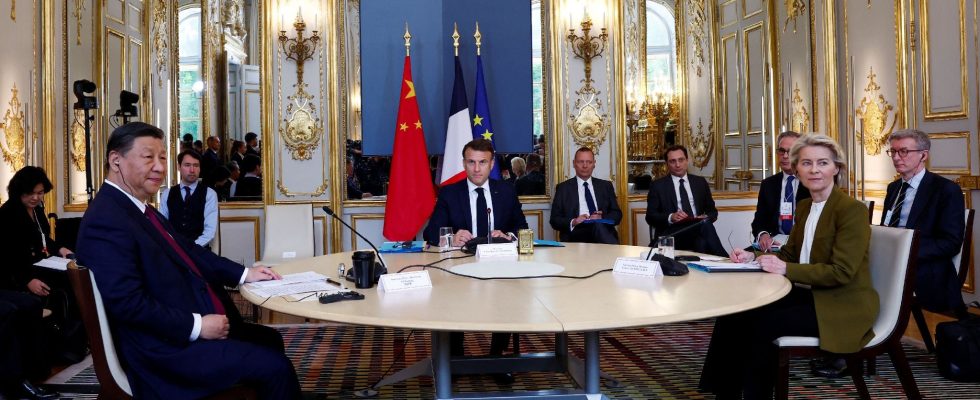Paris rolls out the red carpet for the Chinese president. Xi Jinping begins a two-day state visit to France on Monday May 6. Its stated goal: “to work” with its French counterpart Emmanuel Macron to “resolve the crisis” in Ukraine and continue to invest in France. Reception with great fanfare, banquet at the Elysée and more personal getaway in the Pyrenees… If the program seems friendly, there are many disagreements between the two economic powers.
Threatened with being caught between the American and Chinese economies, massively aided by public authorities, the European Union has in recent months increased investigations into Chinese state subsidies to several industrial sectors, in particular to electric vehicles, accused of distorting competition. China responded on cognac, launching an anti-subsidy investigation on brandy. A hard blow for France whose trade deficit continues to widen with its Chinese partner.
Since the start of its mandate, the executive has nevertheless repeated its objective of “rebalancing”. Friday May 2, Emmanuel Macron recalled the importance of defending France’s “strategic interests” and the need to engage in “economic relations based on reciprocity” with China, in an interview with the British magazine The Economist. This morning, at the opening of a three-way meeting in the presence of the President of the European Commission Ursula von der Leyen, the French President once again hit the nail on the head by advocating “fair rules for all” in trade trade between Europe and China.
Since the 2010s, the trade balance between France and China has largely stabilized in favor of the latter. Here we are talking about the difference between the value of exports and imports of goods. In 2023, France will have imported approximately 71 billion euros of Chinese goods and services, according to figures from French Customs. Conversely, France exported to the Middle Kingdom for around 25 billion euros, or almost three times less. Result: a trade deficit of 46.3 billion euros, after reaching a record of 53.6 billion the previous year.
Certainly, the weight of exports grows from year to year, but the gap does not weaken between the two countries since the trade deficit has multiplied tenfold in two decades since Beijing’s entry into the WTO in 2001. Already in 2003, France exported 5 billion to China compared to 17 billion. In which area is France the most dependent? On the podium, there is the pharmaceutical sector, where it imported 19.2 million euros in 2023 from China, compared to 20.7 the previous year. The health crisis linked to Covid-19 had shed a harsh light on Europe’s dependence on Chinese medicines.
Electric batteries increase dependence
To make matters worse for the French position, certain products manufactured in China are becoming more and more strategic, such as electrical and computer equipment. They represent 30% of imports, again according to French Customs. The Middle Kingdom is also the world’s leading producer of graphite (67% of global supply), according to data from the American Geological Survey. However, this material is used in particular in electric vehicle batteries.
A godsend in a world that is trying to undergo its energy transformation. While the French government aims to sell 800,000 electric cars by 2027, China is therefore a partner of choice. In 2023, France imported 128.4 million euros of electric batteries from the Asian giant. So to limit its dependence, France is trying to catch up. Particularly in the electric battery sector with the opening in Billy-Berclau (Pas-de-Calais), of a first battery production factory in May 2023.
At European level, we are thinking about how to limit damage. In a report dated March 2024 and titled “EU-China relations: de-risking or de coupling- the future of the EU strategy towards China”, the European Parliament believes that we should not put our eggs in one basket. It describes its strategy of “collaborative risk reduction” which consists of “managing and improving relations with key partners, notably the United States and others, such as Japan or South Korea, which have strengthened economic security a priority.”
The Twenty-Seven divided on the strategy to adopt
That being said, the Twenty-Seven are struggling to agree on a solid action plan. In an interview with La Tribune Sunday, Emmanuel Macron admitted that Europeans are “not unanimous” on the strategy to adopt because, he said, “certain players still see in China essentially a market of outlets” while it “exports massively to Europe “. He pleads to “better protect our national security”, “be much more realistic in the defense of our interests” and “obtain reciprocity”.
One thing is certain: Brussels wants to avoid its dependence on Chinese power serving as a lever for the latter to impose its geopolitical views. While Beijing is an unfailing ally of Vladimir Putin’s Russian power, engaged in the war in Ukraine, being economically dependent on an authoritarian regime complicit in Moscow is not ideal on the diplomatic stage. It remains to be seen how the EU will proceed without risking annoying its Chinese partner. For its part, the world’s factories intend to continue to water the planet with their products, especially with sluggish domestic demand.
